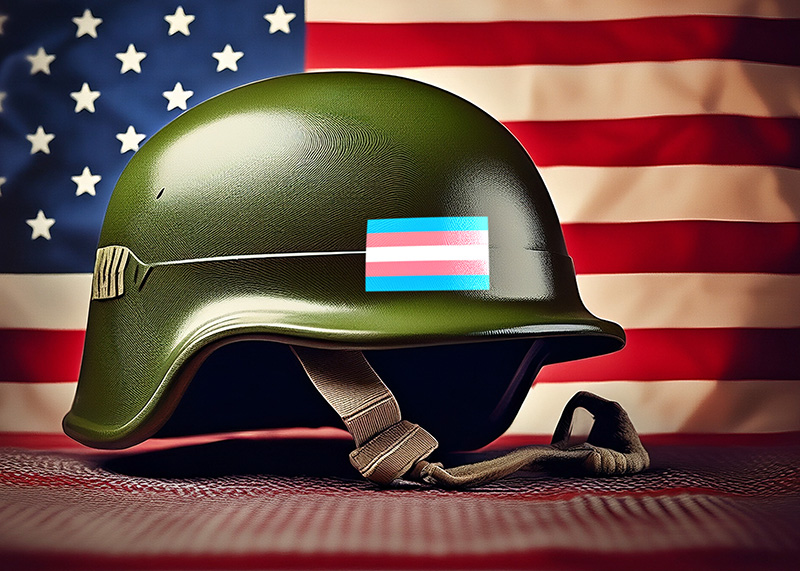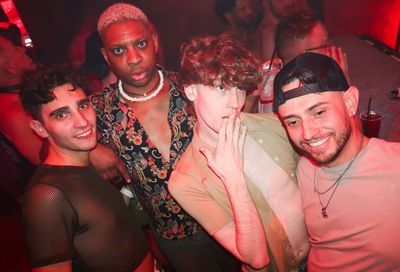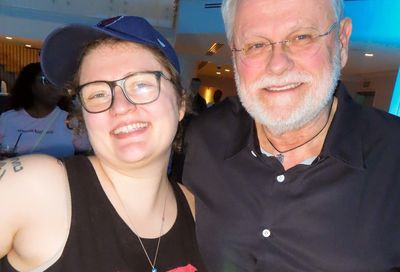MacKenzie Scott, formerly Bezos, gives $46 million to LGBTQ nonprofits
LGBTQ recipients are among a list of 116 nonprofits that are doing transformative work on racial, social and environmental justice

MacKenzie Scott, the former wife of Amazon CEO and billionaire Jeff Bezos, has donated $1.7 billion of her fortune to 116 nonprofits fighting for social and environmental justice, with $46 million of that total specifically going to groups advocating for LGBTQ equality.
Scott’s donations come after she signed onto the Giving Pledge initiative last year. The initiative, launched by Warren Buffet and Bill and Melinda Gates, promotes philanthropy by encouraging the world’s richest people to dedicate a majority of their wealth to charitable causes, either during their lifetimes or in their wills.
On Tuesday, Scott, whose net worth is estimated at around $60 billion, according to the Bloomberg Billionaire’s Index, penned a post on Medium announcing the organizations she donated money to as part of the pledge and explaining why she selected those nonprofits.
“Last year I pledged to give the majority of my wealth back to the society that helped generate it, to do it thoughtfully, to get started soon, and to keep at it until the safe is empty,” Scott wrote in the post. “Like many, I watched the first half of 2020 with a mixture of heartbreak and horror. Life will never stop finding fresh ways to expose inequities in our systems; or waking us up to the fact that a civilization this imbalanced is not only unjust, but also unstable.
“What fills me with hope is the thought of what will come if each of us reflects on what we can offer. Opportunities that flowed from the mere chance of skin color, sexual orientation, gender, or zip code may have yielded resources that can be powerful levers for change,” she added. “People troubled by recent events can make new connections between privileges they’ve enjoyed and benefits they’ve taken for granted. From there, many will choose to share some of what they have with people whose equal participation is essential to the construction of a better world.”
Scott explained how, utilizing a team of nonprofit advisors representing various identity groups that have been historically marginalized to help her find and target nonprofit organizations pushing for transformative societal change. The nine areas that Scott decided to focus on were: racial equity, LGBTQ+ equity, gender equity, economic mobility, empathy and bridging divides, functional democracy, public health, global development, and climate change.
The money was distributed in a lump sum unless otherwise requested, with each nonprofit given maximum flexibility in how to best spend this new windfall.
Scott notes that the overwhelming majority of nonprofits she’s chosen are run by leaders from those historically marginalized communities she is trying to help. For instance, in the case of the LGBTQ nonprofits, 100% are run by LGBTQ leaders.
See also: HRC: Economic fallout from COVID-19 has “hit trans community especially hard”
“All of these leaders and organizations have a track record of effective management and significant impact in their fields,” Scott noted. “Every one of them is tackling complex challenges that will require sustained effort over many years, while simultaneously addressing consequences of the COVID-19 pandemic. And every one of them would benefit from more allies looking to share wealth of all types and sizes, including money, volunteer time, supplies, advocacy, publicity, networks and relationships, collaboration, encouragement, and trust.”
The LGBTQ nonprofits selected by Scott are: the Astraea Lesbian Foundation for Justice, the Fund for Trans Generations, the LGBTQ education nonprofit GLSEN, the International Trans Fund, Lambda Legal, the National Center for Lesbian Rights, PFLAG National, Point Foundation, the LGBTQ elder-centric organization SAGE, Southerners on New Ground, the Trevor Project, and Transgender Law Center. While not exclusively LGBTQ, the Leadership Conference Education Fund, the National Women’s Law Center, UnidosUS, and the NAACP Legal Defense and Education Fund were other beneficiaries with a history of allying themselves with LGBTQ causes.
“NCLR is immensely honored to be a recipient of Mackenzie Scott’s incredible philanthropic journey,” Imani Rupert-Gordon, the executive director of the National Center for Lesbian Rights, said in a statement. “In a world where wealth distribution isn’t equitable, Scott’s commitment and practice of sharing power, privilege and resources make us all stronger.”
Rupert-Gordon noted that the gift from Scott will be used to help NCLR continue providing COVID-19-related services to their LGBTQ clients, including work to decarcerate vulnerable LGBTQ youth during the pandemic and collaborating with the National LGBTQ Anti-Poverty Action Network to assist LGBTQ people in need of relief due to the COVID-19 pandemic’s effects.

Lambda Legal also praised the gift from Scott.
“This gift will help us expand our efforts to counter the far right’s effort to roll back the rights Lambda Legal has painstakingly won for our community since we were founded in 1973 and will fuel our fight for full equality for LGBT people and everyone living with HIV,” Kevin Jennings, the CEO of Lambda Legal, said in a statement.
“For nearly fifty years, Lambda Legal has been winning in courts around the country, and this generous investment will allow us to build upon our record of hard fought victories at all levels of the judicial system, from the Supreme Court down, and will empower us to finish the fight for full legal equality in the years to come,” Jennings added, noting that the money will also be used to launch new initiatives.
Eliza Byard, the executive director of GLSEN, called Scott’s gift a “remarkable, incredibly generous, and beautifully well-timed investment” in the organization’s work. She noted that Scott has a record of working on bullying prevention, one of the areas in which GLSEN has been involved, and that may have influenced her and her advisors’ decision to select GLSEN as one of the gift recipients.
“This gift makes a couple of crucial things possible at one of the most challenging moments for nonprofits in this country and historical memory,” Byard told Metro Weekly in an interview. “We are facing epic uncertainty in terms of the philanthropic landscape. We are facing long overdue uprisings over inequity and the racism and white supremacy baked into many of our institutions, including K-12 education, which, of course, is GLSEN’s primary focus. And we’re dealing with the the ways that a pandemic is literally disrupting interpersonal relationships.
“So what we can do with this kind of gift is threefold. We are in the midst of organizational evolution and strategic planning, and we will be in a position to launch new strategies,” Byard added. “We’re in this process now of responding to the disruption of school and providing a hub of community for LGBTQ+ students in the midst of the pandemic. We are in the midst of a top-to-bottom evolution to audit everything we do in terms of anti-racist practice. And we’re in a position to bolster our strategic reserves so that we can move forward with confidence in a way that is so rarely afforded to two nonprofits.”

Jorge Valencia, the executive director and CEO of Point Foundation, said that Scott’s gift would help the organization support its scholarship recipients during the ongoing COVID-19 pandemic.
“We’re certainly living in very uncertain times,” Valencia told Metro Weekly. “Our scholars who were living on campus, lost campus housing meal plans, access to Internet, and some of them, who did not have a safe place to go, or homes to go to, did look to us. And we were able to help them. So some of this support is going to help us [support] those individuals that are still in need of housing and food and supplies so they can continue to study.
“We’re also looking to also deepen our support of people of color. And so earlier this year, we announced the launch of a BI POC LGBTQ scholarship initiative,” he added, referring to a scholarship specifically geared toward black and indigenous LGBTQ people. “And given the systemic racism in higher education, we believe that we can do even more. We’re very proud of the fact that currently close to 75 percent of our scholars identify as people of color. But we know that there’s more support that we can that can be given there.”
Valencia added that Point has launched a program to support individuals in their final year of community college, as well as a two-year community college program, in addition to its current support for those attending four-year undergraduate institutions or graduate school. And the organization is trying to make sure that the community college scholarship support is available at various times during the year, since those scholars are not necessarily attending full-time during the traditional school year.
“We have no idea how COVID is going to continue to impact young people, or some of our our scholars who were on the front lines,” says Valencia. “And so it could be that some may have to defer for years. But we want to make sure that that money is there to support them as they continue on their pursuit of a higher education.
“The other thing is that we are also in an election year, he adds, noting that many of Point Foundation’s chief contributors are also campaign donors. “So, typically, we see a bit of a decline in contributions to the organization during this time. And so this gift is really helping us during this period as we continue to sort things out.”
Read more:
Dr. Rachel Levine says transphobic attacks “perpetuate a spirit of intolerance”
Stella Immanuel: Doctor retweeted by Trump accused gays of “homosexual terrorism”
6 in 10 Americans wrongly believe HIV can be spread through casual contact, survey says
[bookshelf id=’2′]
Support Metro Weekly’s Journalism
These are challenging times for news organizations. And yet it’s crucial we stay active and provide vital resources and information to both our local readers and the world. So won’t you please take a moment and consider supporting Metro Weekly with a membership? For as little as $5 a month, you can help ensure Metro Weekly magazine and MetroWeekly.com remain free, viable resources as we provide the best, most diverse, culturally-resonant LGBTQ coverage in both the D.C. region and around the world. Memberships come with exclusive perks and discounts, your own personal digital delivery of each week’s magazine (and an archive), access to our Member's Lounge when it launches this fall, and exclusive members-only items like Metro Weekly Membership Mugs and Tote Bags! Check out all our membership levels here and please join us today!























You must be logged in to post a comment.